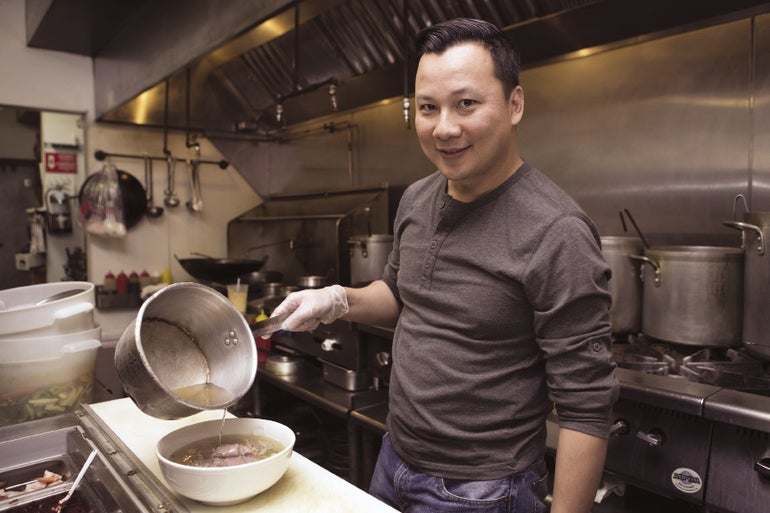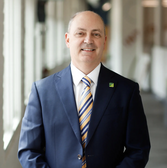Coming to Worcester: The city's immigrant population has shifted in the last decade
 PHOTO/MATT WRIGHT
Business owner Son Vo, at his Pho Sure restaurant in Shrewsbury
PHOTO/MATT WRIGHT
Business owner Son Vo, at his Pho Sure restaurant in Shrewsbury
For a century starting in the 1870s, immigrants moving into Worcester almost exclusively came from Europe and North America.
In the early days, they were largely from Ireland – which made up an overwhelming 70 percent of all Worcester foreign-born residents 150 years ago – followed by Canada and England.
It's much different today.
As of the last decennial Census in 2010, only one of the top 10 most common home countries speak English as their primary language. Brazil, Vietnam, Ghana and the Dominican Republic made up the largest share of Worcester immigrants, followed by Albania and China.
“We would still be eating meat and potatoes if it weren't for immigrant businesses,” said Ramon Borges-Mendez, an associate professor of community development and planning at Clark University.
Immigrants are bringing their vastly different cultures to Worcester, along with an entrepreneurialism driving the city's economy and changing many of its streetscapes with Brazilian bakeries, Vietnamese restaurants, Dominican hair salons and more.
“Everything you put your mind to, you can do, right?” said Son Vo, a Worcester resident and native of Vietnam.
Vo grew up knowing just what it would take to run a Vietnamese restaurant. His mother ran a restaurant in their native country, and he and his siblings loved helping out when they could.
After trying a career in sales, Vo began training with a chef friend to learn sushi and would practice religiously how to prepare different foods in his kitchen at home. After testing his cooking at an Asian market in Burlington, he was ready to go – even if his mom advised him against following her into the business.
“I did it anyway,” he said with a smile.
Vo opened the restaurant Kaizan Sushi Bar & Grill in Sturbridge in 2007, with the help of a few friends and business partners, followed by Pho Sure in Shrewsbury in 2014. Now, he's planning to open a tapas bar on Franklin Street in Worcester this winter.
Coming to America
As of 2016, the largest Worcester immigrant communities hail from Ghana (10 percent), the Dominican Republic (9 percent), Vietnam (9 percent), Albania (6 percent) and Brazil (5 percent).
“It's a mix of everyone,” said Khalil Yatim, a native of Sierra Leone who runs the gas station chain Yatco Energy with two of his brothers. “Honestly, you think about it, what's the U.S. made of? It's a blend of everything, everyone.”
Omar Sherzai was nearing 16, a critical age for a boy who would likely be called to fight in a war in his native Afghanistan in the early 1980s when the country was embroiled in an invasion from the Soviet Union. He came to the U.S. as a refugee with his mother.
“We came here to seek peace,” said Sherzai, whose older sister was already living in Worcester.
Sherzai was joined in 1991 by a childhood friend, Fowzia, who would later become his wife. Together, they opened Pomir Grill in 2012, a Shrewsbury Street restaurant serving Afghan dishes like kabobs and borani.
Oriola Koci came to Worcester in 1996 as a 19-year-old, with her parents enrolling in a diversity visa program to give her a better education. After studying business at Assumption and Clark University, Koci began a career in human relations. She decided it wasn't for her, and not why her parents took her to America, she said.
Koci started Worcester restaurants Livia's Dish and Altea's Eatery, with her husband, another Albanian immigrant, Enton Mehillaj. She sees Worcester as a city built by immigrants for immigrants.
“This is definitely a melting pot kind of city,” Koci said.
Lilian Radke also came to America for a better education, moving from her native Brazil to the University of Arkansas on a volleyball scholarship. She didn't plan to stay in American beyond that, but while in college, she met another Brazilian native, Silvano Radke, now her husband. They came to Massachusetts, and he started a cleaning business, Unic Pro.
Lillian joined the company in 2010, and then took over as owner when her husband left the business a year later to start another operation. Today, Unic Pro has $5 million in annual sales from 154 accounts in Massachusetts, New Hampshire and Rhode Island and around 150 employees. This year, the U.S. Small Business Administration named Radke the Massachusetts Woman Small Business Owner of the Year.
“My mom, she taught us to be go-getters,” Radke said. “When we see an obstacle, we just keep going.”
Adapting to America
As the primary countries of origin as of the 2010 census the non-English-speaking population in Worcester has risen. From 2004 to 2015, the percent of English Language Learners in Worcester Public Schools grew from 14 percent to 35 percent, according to a 2015 study from Worcester nonprofit Seven Hills Foundation.
“I worked on it,” Sherzai said of learning English. His native language from Afghanistan was read from right to left, so he had to learn English backwards. “I didn't want to be one of those immigrants speaking with an accent after being here 90 years.”
Rosy and Marcos Reynoso, owners of Rosy's Beauty Salon and Rosy's Grocery in Worcester, have lived in America for 30 years. Rosy also ran a salon in their native Dominican Republic.
Though the couple still struggles with fluent English, Rosy and Marcos talk more of the ease of getting used to life in America than they do the challenges. Marcos, a laid-back man of few words, said the couple didn't start with any sense of risk or fear in starting their business in a place where they still had few language skills to work with.
“If that happens, you won't ever start,” he said, speaking through a translator.
Mixing their culture into Worcester
In a Worcester Regional Research Bureau survey of 24 immigrant business owners in Worcester, most respondents said their clientele shared their ethnic background less than 50 percent of the time, indicating their businesses had an impact beyond their existing immigrant communities.
Businesses opened by immigrants in Worcester bring pieces of home from their owners' native countries. Owners talk about the pride they feel in introducing Americans to a dish they may have eaten growing up or a brand they have a nostalgic connection with.
At Rosy's Beauty Salon, it's the Latin music playing loudly on the radio. At Pho Sure, it's the design inside the restaurant meant to evoke the way a restaurant might be set up in an alleyway in Vietnam.
Koci and Mehillaj opened restaurants with Mediterranean and French food reminding them of Europe.
“We're bringing something from home,” Koci said.
Six years after Pomir Grill opened, the Sherzais still have a niche to themselves, as what they say is the only Afghan restaurant in Worcester County. They often get lumped by restaurant guides into Indian or Mediterranean, as if there's not enough of a distinction to what they cook.
“We don't have our own identity like that,” Sherzai said.
No matter what category its Afghan dishes are placed in, Pomir Grill doesn't serve just people from the Middle East or Asia.
“We would never have made it if it weren't for white people,” Sherzai said with a laugh.
CORRECTION: Ghanaians speak English as their primary language. An earlier version said that none of the 10 largest immigrant groups in Worcester spoke English as a primary language.












0 Comments